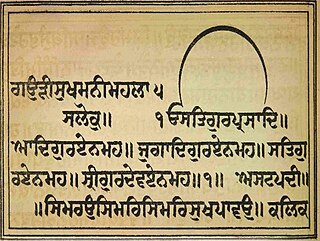Surjeet Kalsey is a Canadian poet, dramatist, short story writer and translator who lives in British Columbia and writes in both Punjabi and English. She has published a dozen books.

Sukhmani Sahib, known under the title of Gauri Sukhmani in the scripture, is usually translated to mean Prayer of Peace is a set of 192 padas present in the holy Guru Granth Sahib, the main scripture and living Guru of Sikhism from Ang 262 to Ang 296. This Gurbani text was written by the 5th Guru, Guru Arjan (1563–1606) at Amritsar in around 1602. Guru Arjan first recited the bani at Gurdwara Barth Sahib in the Gurdaspur district of Punjab, India.

Kartar Singh Duggal was an Indian writer who wrote in Punjabi, Urdu, Hindi, and English. His works include short stories, novels, dramas and plays. His works have been translated into Indian and foreign languages. He has served as director of the All India Radio.

Jaswant Singh Kanwal was an Indian novelist, short story writer and essayist of the Punjabi language. He was born in the village of Dhudike, Moga District, Punjab, India. As a young teenager he left school and went to Malaya. It was there that he first got interested in literature. He returned to Dhudike after a few years and has lived there ever since. He was awarded the Punjabi Sahit Shiromani Award in the year 2007.

Giani Gurmukh Singh Musafir was an Indian politician and Punjabi language writer. He was the Chief Minister of Punjab from 1 November 1966 to 8 March 1967.
Suresh Bhardwaj is an Indian theatre, film and television director as well as a lighting and scenic designer. He has acted in many plays as lead actor as well. He is the director of (Aakar Kala Sangam) (AKS), a Delhi based theatre group. He has also served as faculty member of the National School of Drama In 2005 he received the Sangeet Natak Akademi Award for lighting design from the Sangeet Natak Akademi, India's National Academy of Music, Dance & Drama.

Prem Parkash is a writer from Punjab, India. He "is one of the major short story writers in post-1947 East Punjabi literature." He is also known as Prem Parkash Khannvi.

Rana Nayar is a translator of poetry and short fiction from Punjabi to English. He has more than forty volumes of poetry and translation works to his credit. He is also a theatre artist and has participated in a number of major full-length productions. He won Sahitya Akademi Golden Jubilee prize for his English translation of the Punjabi devotional poetry of Saint Baba Farid.
Gurdial Singh Rahi was an Indian writer and novelist who wrote in Punjabi. He started his literary career in 1957 with a short story, "Bhaganwale." He became known as a novelist when he published the novel Marhi Da Deeva in 1964. The novel was later adapted into the Punjabi film Marhi Da Deeva in 1989, directed by Surinder Singh. His novel Anhe Ghore Da Daan was also made into a film of the same name in 2011 by director Gurvinder Singh. Singh was honoured with the Padma Shri in 1998 and Jnanpith Award in 1999.

Dalip Kaur Tiwana was one of the foremost novelists and short-story writers of contemporary Punjabi literature. She won awards, both regional and national, and was a widely translated author. She retired as Professor of Punjabi, and Dean, from Punjabi University, Patiala. She is widely credited as a tour-de-force in the creation of the contemporary literature in the Punjabi language.

Gurbaksh Singh (1895–1977) was an Indian novelist and short story writer with more than fifty books to his credit in Punjabi. He is also considered the father of modern Punjabi prose and received Sahitya Akademi Fellowship, New Delhi in 1971.
Muhammad Afzal Ahsan Randhawa was a Pakistani Punjabi language writer, poet, translator, playwright and a politician. He authored several short stories and novels in the Punjabi language including Sooraj Grehan and Doaba.

Uday Prakash is a Hindi poet, scholar, journalist, translator and short story writer from India. He has worked as administrator, editor, researcher, and TV director. He writes for major dailies and periodicals as a freelancer. He has also received several awards for his collection of short stories and poems. With Mohan Das he received Sahitya Academi Awards in 2011. He is the first author to return his Sahitya Akademi award on Sep 3, 2015 against the killing of M. M. Kalburgi that initiated a storm of national protests by writers, artists,scholars and intellectuals. .

Sukhbir, alias Balbir Singh, was a Punjabi novelist, short-story writer, poet and essayist. He wrote and published for fifty years. He wrote seven novels, 11 short story collections, and five poetry collections, and made many translations of world literature, essays, letters and book reviews.
Taragarh Talawa is a village which now officially called Taragarh located at two kilometers from Jandiala Guru, Amritsar district, Punjab, India on the Grand Trunk Road, located at 31° 33' 41N 75° 1'36E at an altitude of 229 m (754 ft).

Harbans Singh was an educationist, administrator, scholar and the editor-in-chief of the Encyclopaedia of Sikhism. He was respected for his contributions to Sikh scholarship and Punjabi literary studies and had a vital and pervasive influence in the field of religious studies, with special reference to Sikhism.
The Dhahan Prize is an annual prize awarded by Canada-India education society for excellence in Punjabi fiction. The prize is given to three books of fiction, written in either Gurmukhi or Shahmukhi script of Punjabi. The prize is named after Canadian Punjabi businessman, Barj Singh Dhahan.

Sarghi Jammu is a Punjabi author and academician. She was one of the finalists for the 2021 Dhahan Prize for her short-story collection Apne Apne Marseia.












